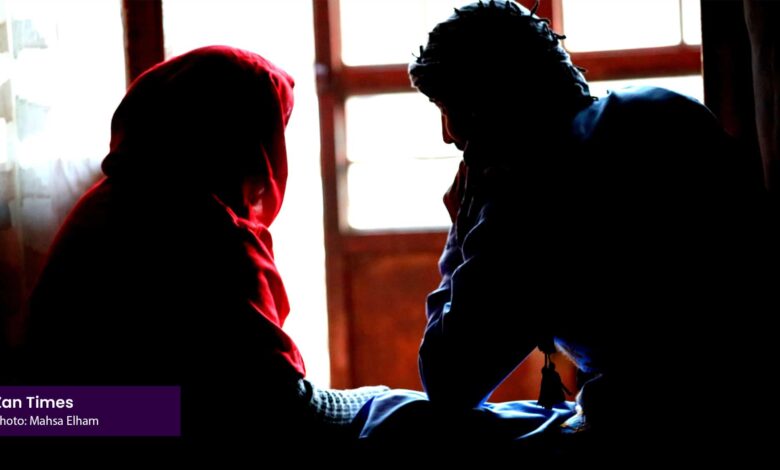What happened to Qadria and Atiq? The Crime of Love Under the Taliban – Women’s eNews

By Zahra Nader and Kreshma Fakhri (Originally published in Zan Times)

It was late July 2023 when news began to circulate on social media: The Taliban were going to stone to death an unmarried couple for eloping. The story was repeated in several local media sources within Afghanistan, including the country’s well-known newspaper, 8 Am, which quoted sources saying that the stoning would occur the next day, July 29.
In the end, the couple was not stoned to death last summer. Instead, the Taliban sentenced them to five years in prison in Baghlan province, sources close to the couple tell Zan Times. When the day of their execution passed without a public stoning, interest in the story of the lovers evaporated. But in the past five months, Zan Times pieced together what happened to Qadria and Atiq. She is a 28-year-old teacher who is married and a mother of three, while he is a 35-year-old head teacher, who is also married and the father of six.
Though the crime with which the Taliban charged them is not clear – local and senior Taliban spokesmen, including Zabihullah Mujahid, refused to provide information on the case to Zan Times even after being asked at least 14 times to provide or confirm details – by speaking to the couple’s families, relatives, and friends, we show how one personal decision – to love someone and elope – can change their life and those of their families.
Who are they and how their relationship started?
Qadria was a 17-year-old high school student when her family married her to her cousin, Mohammad Azam. “She did not agree with the marriage; she didn’t like her husband, and she wanted to study and become a lawyer,” explains a school friend. Her marriage was a bride exchange, meaning Qadria’s brother also married her husband’s sister.
After the marriage, Qadria’s husband took her to a remote district of Baghlan, where she had no opportunity to take the university entrance exam and pursue her dream of a legal career. Reluctantly, Qadria accepts her fate and becomes a mother. While raising her children, she takes a teacher training course and then starts work as schoolteacher.
Eventually, they moved to Pul-e Khumri city, the capital of Baghlan province, where Qadria’s parents lived. Qadria found a job in Zamirabad, a primary school for boys and girls up to the sixth grade. It was there that she met Atiq, who was the school’s headmaster. Shortly after Qadria started her new job, her husband left for Iran to find work.
Several sources, including friends and colleagues of Qadria, say that it was during her husband’s time in Iran that she began a romantic relationship with Atiq. “During the days when her husband was absent, Qadria spent her time with her three children,” a close friend tells Zan Times. “Nights full of longing and despair made her attachment to Atiq grow, and eventually, she decided to stay with her love.”
In contrast, her husband, Mohammad Azam, claims that he and Qadria “had a happy life together” during their 12 years of marriage. He says he never imagined that Qadria would leave him for another man and claims that Qadria didn’t leave him willingly.
Qadria’s father, Abdul Khalil Rahmani, says that his family’s crisis began on Wednesday, July 5, 2023, when his daughter went to work at the school but never returned home that night. He says that they searched for Qadria for days before discovering that Atiq had taken her to Kabul. In their first interview with Zan Times, Qadria’s parents claimed that Atiq “kidnapped” her. Abdul Khalil Rahmani filed a complaint against Atiq with the Taliban, which launched a hunt for the couple.
Weeks later, the Taliban arrested the couple in Kabul and transferred them to Kelagai prison in Baghlan province, where Qadria and Atiq are imprisoned to this day.
Atiq’s father has a completely different account of what occurred. Najibullah Sediqi tells Zan times that Atiq and Qadria were not in a romantic relationship. He alleges that Qadria’s husband divorced her over the phone, and when Qadria wanted to formalize this divorce in court, her father prevented her and threatened to kill her. So Qadria turned to Atiq, asking for his help to escape her abusive father.
To back up his story, Najibullah Sediqi shared a short voice message of a woman who introduced herself as Qadria. In the one-minute-26-second audio file, the woman states, “Two years ago, my husband divorced me over the phone, I informed my father, and he beat me, saying even if he divorced you 100 times and never came back for another 10 years, sit quietly in his name as his wife. I reminded him many times about being divorced, but they beat and threatened to kill me.”
The female voice appears stilted, as if she is reading from a script. Since we couldn’t verify whether it is Qadria’s voice, we played the recording for her father, who confirmed that the voice belonged to Qadria.
Both her father and husband insist that no divorce had taken place. Qadria’s father denies ever attempting to harm her, instead, he says he brought Qadria and her children to his house to care for her. He says he was informed about the romantic relationship when Atiq’s wife once came to his house and asked him to stop Qadria from meeting her husband. One of the neighbours confirms the incident: “There was a commotion in the alley. Atiq’s wife had come to confront Qadria, telling her, ‘You shameless and disgraced woman. You are a married woman with children; why are you talking to my husband?’”
Arrest on charges of committing moral crimes
Eloping or running away from home has long been a punishable “moral crime” even though many women were fleeing domestic violence. In May 2013, Human Rights Watch (HRW) asked the U.S.-backed Afghan government to “take urgent steps to halt an alarming increase in women and girls imprisoned for ‘moral crimes.’” By May 2013, HRW reported that about 600 women and girls were imprisoned for such “moral crimes,” a number that was rapidly increasing. In 2012, HRW “documented that some 95 percent of girls and 50 percent of women imprisoned in Afghanistan were accused of the ‘moral crimes’ of ‘running away’ from home or zina (sex outside of marriage).”
And stoning for the “crime” of elopement didn’t begin with the return of the Taliban. In 2015, a teenage girl named Rukhshana was stoned to death after being caught eloping with her lover. “She was buried waist deep in dirt and stoned to death in October 2015 by a gang of men the government said were Taliban,” Mujib Mashal and Zahra Nader reported in a story for the New York Times, published in July 2017. The incident shocked the nation.
At the time, we could point to one or two “lawless afghan provinces” where there was no justice and value for women. Now that the Taliban is in charge, all of Afghanistan is a lawless country for women. No infraction of the Taliban’s harsh code is too small. Since January 2024, Taliban forces have arrested women out in public on allegations that they were not properly observing the Taliban’s prescribed dress code.
The result of such harsh measures is that many lovers aren’t allowed to leave their homes on Valentine’s Day, let alone to celebrate their love. The days when a young generation of Afghans celebrated the romantic day with cakes, red roses and heart shaped balloons are now a distant memory. In the past two years, the Taliban have banned any celebration of Valentine’s Day. They prevent any hint of celebration by patrolling the streets and gift shops on February 14. Anyone defying the rules is persecuted. Now, depression rather than hope grips the country’s young, who can’t celebrate their love in public.
The social consequences of Qadria and Atiq’s arrest
While the relationship between Qadria and Atiq is a personal choice of two adult individuals, in Afghanistan, it is also a crime that affects their families and relatives. Individuals and families feel the effects based on their proximity to or distance from the accused. In this kinship chain, of course, it is always the woman or the girl who bears significant blame for dishonouring and bringing shame to the family.
Qadria’s family has become socially isolated since the news of Qadria and Atiq’s arrests became public, a family friend who lives in the same neighbourhood tells Zan Times. Her mother rarely participates in social gatherings and many relatives have cut ties with her family. “They stopped mingling with her family because they are angry with them and asked why they didn’t kill Qadria to restore the family and tribe’s honour?” the friend explains.
Abdul Khalil Rahmani, Qadria’s father, says his daughter has repeatedly said that she regrets her actions: “She says I made a mistake, father, I made a big mistake. I ruined my family and my children’s fate. But now that she admits her mistake, it doesn’t help; the family’s honour cannot be restored.”
Fawzia, Qadria’s mother, says that their relatives and neighbours scolded and humiliated her when the news of her daughter’s disappearance spread: “The pain and humiliation are overwhelming. May not God bring my fate upon my enemy even!” Fawzia tells Zan Times in a phone interview. Now, she is caring for Qadria’s children. “From morning till evening, the children cry, asking me to bring their mother to them,” Fawzia says. The youngest is not yet three years old.
As for Qadria, her life in Kelagai prison in Baghlan has been harsh. She had been beaten several times, including being whipped 150 times for an alleged protest inside the prison, says a source who is familiar with her situation behind bars. “She has been beaten so severely that she could barely move her body,” the source explains. “Her entire body was bruised.”
Freshta Ghani contributed to this report.





